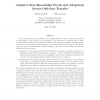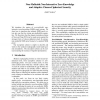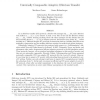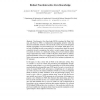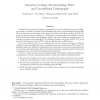18 search results - page 1 / 4 » Adaptive Zero-Knowledge Proofs and Adaptively Secure Oblivio... |
TCC
2009
Springer
14 years 10 months ago
2009
Springer
In the setting of secure computation, a set of parties wish to securely compute some function of their inputs, in the presence of an adversary. The adversary in question may be st...
FOCS
1999
IEEE
14 years 1 months ago
1999
IEEE
We introduce the notion of non-malleable noninteractive zero-knowledge (NIZK) proof systems. We show how to transform any ordinary NIZK proof system into one that has strong non-m...
ASIACRYPT
2008
Springer
13 years 11 months ago
2008
Springer
In an oblivious transfer (OT) protocol, a Sender with messages M1, . . . , MN and a Receiver with indices 1, . . . , k [1, N] interact in such a way that at the end the Receiver ...
CRYPTO
2001
Springer
14 years 1 months ago
2001
Springer
Abstract. Non-Interactive Zero Knowledge (NIZK), introduced by Blum, Feldman, and Micali in 1988, is a fundamental cryptographic primitive which has attracted considerable attentio...
CRYPTO
2010
Springer
13 years 10 months ago
2010
Springer
Motivated by the question of basing cryptographic protocols on stateless tamper-proof hardware tokens, we revisit the question of unconditional two-prover zero-knowledge proofs fo...
